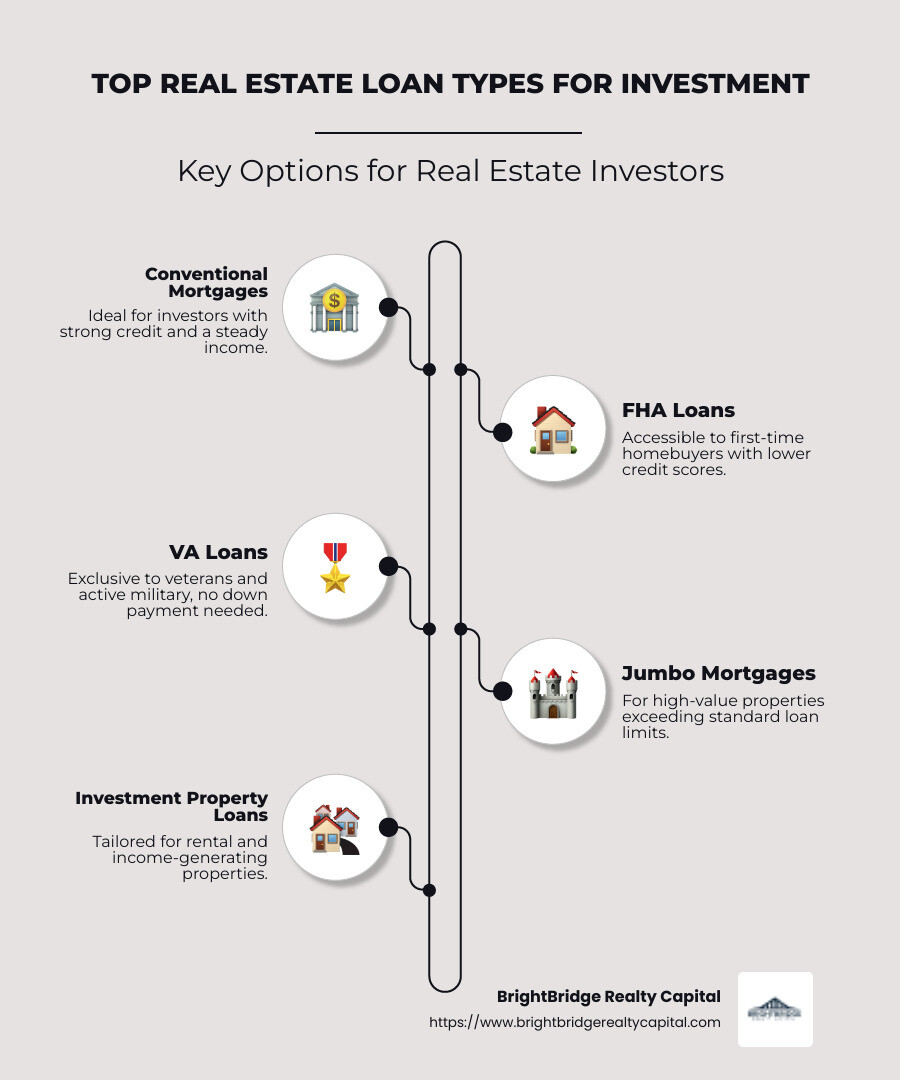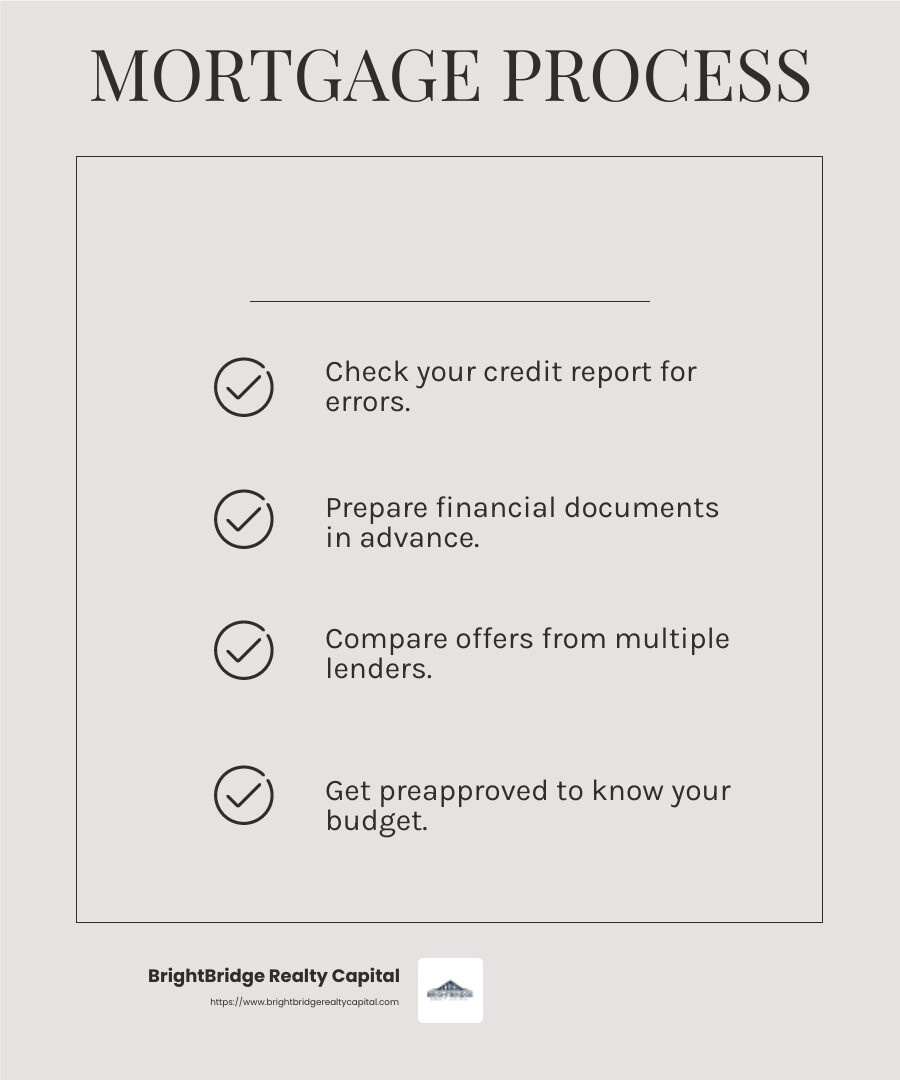Loan Rangers: Navigating the Best Real Estate Loan Options

Best real estate loans are critical for any investor seeking to capitalize on opportunities in the dynamic and often complex world of real estate. To help you get started, here are some key points to consider:
- Conventional Mortgages: Best for those with good credit who want traditional loan terms.
- FHA Loans: Ideal for first-time homebuyers with lower credit scores.
- VA Loans: Suitable for veterans and active military members, offering no down payment.
- Jumbo Mortgages: For purchasing high-value properties exceeding conventional loan limits.
Investing in real estate is a time-tested way to build wealth and generate passive income. Yet, the success of any property investment often hinges on securing the right financing. Whether you're looking to purchase your first rental property, expand your portfolio, or venture into vacation homes, choosing the most suitable loan can be daunting.
Navigating various loan options requires understanding credit requirements, down payments, and interest rates. Equally important is finding a lender who can offer a streamlined process and competitive terms to close deals swiftly. BrightBridge Realty Capital, located in New York, NY, is dedicated to providing flexible financing solutions custom to suit diverse investment strategies without the typical red tape or delays. By understanding the landscape of available options, real estate investors can make informed decisions that align with their financial goals and risk appetite.

Best real estate loans word list:
Understanding Real Estate Loans
Real estate loans can seem like a maze, especially if you're venturing into investment properties. Let's break it down into simple steps and key terms to help you steer this landscape.
Loan Types
When it comes to real estate, there are several loan types available, each with its own perks and pitfalls:
Conventional Mortgages: These are the go-to option for many investors. They come with a fixed or adjustable interest rate and are available through private lenders. You'll need a solid credit score and a hefty down payment, often around 20%.
FHA Loans: Backed by the Federal Housing Administration, these loans are ideal for first-time buyers or those with lower credit scores. They require a smaller down payment, making them more accessible.
VA Loans: Exclusively for veterans and active-duty military, VA loans offer the perk of no down payment and competitive interest rates.
Jumbo Mortgages: Designed for luxury properties that exceed conventional loan limits. These loans require excellent credit and a significant down payment.
Private Money Loans: These come from private investors rather than banks. They offer flexibility and speed but often at higher interest rates.
Investment Property
Investing in real estate is a strategic way to build wealth. However, financing an investment property differs from buying a primary residence. Lenders view these properties as higher risk, so they often require:
Higher Credit Scores: A good credit score is crucial to secure favorable rates.
Larger Down Payments: Expect to put down at least 20% to 30%.
Cash Reserves: It's wise to have reserves to cover six to 12 months of mortgage payments.
Investment properties offer the potential for steady cash flow and appreciation over time. However, research thoroughly to ensure the property will be profitable. Consider the location, size, and amenities that align with your investment goals.
Mortgage Process
The mortgage process can be daunting, but understanding the steps can ease the journey:
Check Your Credit: Before applying, review your credit report for errors and work on improving your score if needed.
Gather Documents: Be prepared with financial documents like W-2s, tax returns, and bank statements.
Shop Around: Compare offers from different lenders to find the best terms and rates.
Get Preapproved: This shows sellers you're serious and helps you know how much you can afford.
Close the Deal: Once you've found the right property and loan, work with your lender to finalize the mortgage.

Understanding these basics will help you steer the complex world of real estate loans. Whether you're buying your first rental property or expanding your portfolio, choosing the right loan is crucial for success.

Next, we'll explore the best real estate loans for investors, diving into specific loan options and financing strategies that can maximize your returns.
Best Real Estate Loans for Investors
When it comes to best real estate loans for investors, you have a variety of options to consider. Each loan type has its own benefits and drawbacks, so understanding them can help you make a smart choice for your investment strategy. Let's explore the options available for financing rental properties and maximizing your investment returns.
Loan Options for Rental Properties
Conventional Mortgages
These are the most common loans for investors. They often require a higher down payment—usually between 20% and 30%—and a good credit score. The advantage is that they come with competitive interest rates, especially if your credit score is high.Private Money Loans
If speed and flexibility are your priorities, private money loans can be a great choice. They are less regulated than traditional loans, which means terms can be more negotiable. However, be prepared for higher interest rates and shorter terms. These loans are ideal for short-term investments or quick-turnaround projects.Owner-Financed Loans
In this arrangement, the property seller finances the purchase. This can bypass traditional mortgage processes and offer more flexible terms. But watch out for potentially higher interest rates and the risk of balloon payments.Debt Service Coverage Ratio (DSCR) Loans
These loans focus on the rental property's income rather than your personal income. This makes them attractive if you want a streamlined approval process. DSCR loans often have competitive rates and don't require tax returns or employment verification.
Financing Strategies
Investing in rental properties isn't just about picking the right loan; it's also about employing effective financing strategies to maximize your return on investment (ROI).
Leverage the 2% Rule
This rule suggests that a property is a good investment if it generates monthly rental income equal to or greater than 2% of its purchase price. While it's a rough guideline, it can help you quickly assess potential profitability.Consider Portfolio Loans
If you own multiple properties, consolidating them into a single portfolio loan can simplify management and potentially reduce costs. Portfolio loans can offer more flexibility in terms and conditions, catering to your specific investment needs.Optimize Cash Flow
Ensure your rental income exceeds your mortgage payments and expenses. This means selecting properties in high-demand areas and maintaining them well to minimize vacancy rates.
Final Thoughts
Choosing the right loan can significantly impact your success as a real estate investor. By understanding the options and employing smart strategies, you can build a profitable portfolio. Next, we'll explore the best real estate loans for first-time buyers, focusing on government-backed loans and FHA options.
Top 8 Real Estate Loan Types
When diving into real estate investment, understanding the top 8 real estate loan types can equip you with the knowledge to make informed decisions. Each loan type comes with its own set of advantages and disadvantages, custom to different investment strategies.
1. Conventional Mortgages
Advantages:
- Competitive Interest Rates: Often lower for those with high credit scores.
- Flexibility: Wide range of term options, usually 15 to 30 years.
Disadvantages:
- Higher Down Payments: Typically require 20-30% down.
- Stricter Criteria: Higher credit scores and lower debt-to-income ratios needed.
2. FHA Loans
Advantages:
- Lower Credit Score Requirement: Easier for first-time buyers.
- Lower Down Payments: As low as 3.5%.
Disadvantages:
- Mortgage Insurance Premiums: Required, increasing the overall cost.
- Loan Limits: Restricted by location and property type.
3. VA Loans
Advantages:
- No Down Payment Required: For eligible veterans and service members.
- No Private Mortgage Insurance (PMI): Reduces monthly costs.
Disadvantages:
- Eligibility Requirements: Limited to veterans, active-duty service members, and some reservists.
- Funding Fee: A one-time fee is required, which can be financed.
4. Jumbo Loans
Advantages:
- Higher Loan Limits: Suitable for expensive properties.
- Flexible Terms: Can be customized based on needs.
Disadvantages:
- Stricter Credit Requirements: Higher credit scores and financial scrutiny.
- Higher Interest Rates: Due to the larger loan amount and increased risk.
5. Debt Service Coverage Ratio (DSCR) Loans
Advantages:
- Income-Based Approval: Focuses on property's income rather than personal income.
- Streamlined Process: No need for tax returns or employment verification.
Disadvantages:
- Higher Interest Rates: Reflects the risk of income-based lending.
- Potential for Higher Fees: To compensate for the streamlined process.
6. Portfolio Loans
Advantages:
- Flexibility: Lenders can customize terms to fit the borrower's needs.
- Diverse Property Types: Suitable for various property investments.
Disadvantages:
- Higher Interest Rates: Due to the increased risk for the lender.
- Limited Availability: Not all lenders offer these loans.
7. Private Money Loans
Advantages:
- Quick Approval: Faster than traditional loans.
- Negotiable Terms: More flexibility in structuring the loan.
Disadvantages:
- Higher Interest Rates: Reflects the risk and speed of approval.
- Shorter Loan Terms: Often require repayment in a shorter time frame.
8. Blanket Mortgage Loans
Advantages:
- Consolidation: Finance multiple properties under one mortgage.
- Flexibility in Selling: Can sell individual properties without refinancing.
Disadvantages:
- Higher Rates: Typically higher than traditional loans.
- Cross-Collateralization Risk: Issues with one property can affect the entire portfolio.
Understanding these loan types can help you choose the best real estate loans for your investment goals. Each type offers unique benefits and challenges, so consider your financial situation, investment strategy, and long-term goals when selecting a loan.
Next, we'll explore the best real estate loans for first-time buyers, with a focus on government-backed loans and FHA options.
Best Real Estate Loans for First-Time Buyers
Buying your first home is a big deal. It's exciting but can also be a bit overwhelming. Luckily, there are best real estate loans designed just for first-time buyers. Let's explore what these options are and how they can help you get the keys to your new home.
Government-Backed Loans
Government-backed loans are a great option for first-time buyers. These loans are insured by the government, which means lenders can offer better terms. Two popular types of government-backed loans are FHA loans and VA loans.
FHA Loans
FHA loans are managed by the Federal Housing Administration. They are perfect for first-time buyers because they have lower down payment requirements and more relaxed credit score criteria.
Why Choose an FHA Loan?
- Low Down Payment: You can buy a home with as little as 3.5% down.
- Flexible Credit Requirements: Even if your credit score isn't perfect, you might still qualify.
- Easier to Qualify: The requirements are less strict compared to conventional loans.
However, keep in mind that FHA loans come with mortgage insurance premiums. This means you'll pay both an upfront premium and a monthly fee. But for many first-time buyers, the benefits outweigh these costs.
VA Loans
VA loans are another excellent option if you are a veteran or active-duty service member. These loans offer unique advantages that can make buying a home easier.
Benefits of VA Loans:
- No Down Payment: You can finance 100% of the home's value.
- No Private Mortgage Insurance (PMI): This can save you money each month.
- Competitive Interest Rates: Often lower than conventional loan rates.
To qualify for a VA loan, you need to meet specific service requirements. There's also a funding fee, but it can be rolled into the loan, making it easier to manage.
Other Considerations
While government-backed loans are great, it's also smart to explore state homebuyer assistance programs. Many states offer grants, tax credits, or lower interest rates to help first-time buyers.
Choosing the right loan is about finding what fits your budget and future plans. Whether it's an FHA loan with a low down payment or a VA loan with no PMI, these options can make your dream of owning a home a reality.
In the next section, we'll look at the best real estate loans for those with high credit scores, exploring the benefits of conventional loans.
Best Real Estate Loans for High Credit Scores
If you have a high credit score, you're in a great spot when it comes to securing the best real estate loans. A high credit score can open up lower interest rates and better loan terms, making homeownership more affordable.
Why Credit Scores Matter
Your credit score is a number that shows how reliable you are at paying back money. Lenders look at this number to decide if you are a safe bet. The higher your score, the more likely you are to get a good deal on a loan.
Benefits of a High Credit Score:
- Lower Interest Rates: Lenders offer better rates to people with high scores. This can save you thousands over the life of a loan.
- Better Loan Terms: You might qualify for loans with fewer fees or more flexible repayment options.
- More Loan Options: A high score opens the door to more types of loans, including conventional loans.
Conventional Loans
Conventional loans are a popular choice for those with strong credit. Unlike government-backed loans, these are not insured by the government. This means lenders set their own terms, which can be favorable if your credit is good.
Advantages of Conventional Loans:
- Lower Interest Rates: With a high credit score, you can secure lower rates than many government-backed loans.
- No Mortgage Insurance: If you put down at least 20%, you can avoid paying for private mortgage insurance (PMI).
- Flexible Terms: You can choose from various term lengths, such as 15 or 30 years.
Keep in Mind: While conventional loans offer great benefits, they often require a higher down payment and stricter credit requirements compared to FHA or VA loans.
Maximizing Your High Credit Score
To make the most of your high credit score, shop around for lenders who offer the best terms. Even a small difference in interest rates can have a big impact on your monthly payments and total loan cost.
Tips for Using Your High Credit Score:
- Negotiate Terms: Don't be afraid to ask for better rates or lower fees.
- Consider a Larger Down Payment: This can reduce your loan amount and potentially lower your interest rate.
- Explore Different Lenders: Each lender may offer different terms, so it's worth comparing offers.
In the next section, we'll tackle some frequently asked questions about real estate loans, including how they differ for rental properties and primary residences.
Frequently Asked Questions about Real Estate Loans
What is the best type of loan for a rental property?
When it comes to financing a rental property, choosing the best real estate loans can make a big difference in your investment's success. Rental properties often require a different approach than primary residences.
Popular Loan Types for Rental Properties:
Conventional Loans: These are common for rental properties. They often require a higher down payment, usually around 20-25%, but they offer competitive interest rates for those with strong credit scores.
DSCR Loans: Debt Service Coverage Ratio (DSCR) loans allow you to qualify based on the property's rental income rather than your personal income. This can be a great option if the property generates strong cash flow.
Private Money Loans: These loans can be quicker to obtain and are less strict with credit requirements, but they typically come with higher interest rates.
Tip: Always calculate the property's potential cash flow using a Cash Flow Calculator to ensure the investment is viable.
How do investment property loans differ from primary residence loans?
Investment property loans and primary residence loans have some key differences. Lenders see investment properties as riskier, which affects terms and conditions.
Key Differences:
Down Payments: Investment property loans usually require a larger down payment. While a primary residence might need as little as 3-5%, investment properties often need at least 20%.
Interest Rates: Expect higher interest rates on investment property loans to offset the lender's increased risk.
Cash Reserves: Lenders often require proof of cash reserves to cover several months of mortgage payments for investment properties.
Income Qualification: For investment properties, lenders may allow you to count 75% of the property's rental income as part of your qualifying income. This can help you qualify for a larger loan.
What are the benefits of government-backed mortgage assistance programs?
Government-backed mortgage assistance programs can be a lifeline for many homebuyers, offering unique benefits not found in conventional loans.
Benefits of Government-Backed Loans:
Lower Down Payments: Programs like FHA loans allow for lower down payments, sometimes as low as 3.5%, making homeownership more accessible.
Easier Qualification: These programs often have more lenient credit requirements, which can be helpful for first-time buyers or those with less-than-perfect credit.
VA Loans for Veterans: Eligible veterans can benefit from zero-down financing and lower interest rates, making it easier to purchase a home.
Mortgage Insurance: While FHA loans require mortgage insurance, the overall cost can still be lower due to reduced interest rates and down payment requirements.
Considerations: Always check the specific eligibility requirements for each program, as they can vary based on location and personal circumstances.
In our next section, we'll dig deeper into the various loan types available to real estate investors and how to choose the best one for your situation.
Conclusion
Navigating real estate loans can be challenging, but with the right partner, it doesn't have to be. At BrightBridge Realty Capital, we specialize in providing customized financing solutions that cater to your unique investment needs. Whether you're flipping properties, building from the ground up, or expanding your rental portfolio, our goal is to offer quick funding and seamless service.
Our fast closings, often within a week, set us apart from traditional lenders. We understand that time is money in the real estate market, and our direct lending approach eliminates intermediaries, providing you with competitive rates and a hassle-free process.
With locations in New York, NY, and a nationwide reach, BrightBridge Realty Capital is here to support you every step of the way. Our expertise and custom solutions ensure that you have the financial tools needed to succeed in your real estate ventures.
Ready to explore the best real estate loans for your investment strategy? Learn more about our customized financing solutions and take your real estate investments to the next level with BrightBridge Realty Capital.


